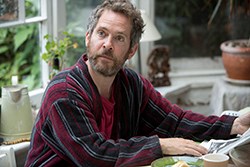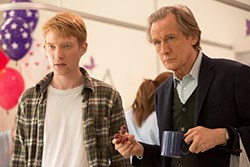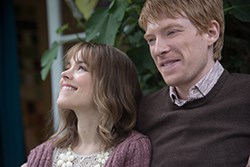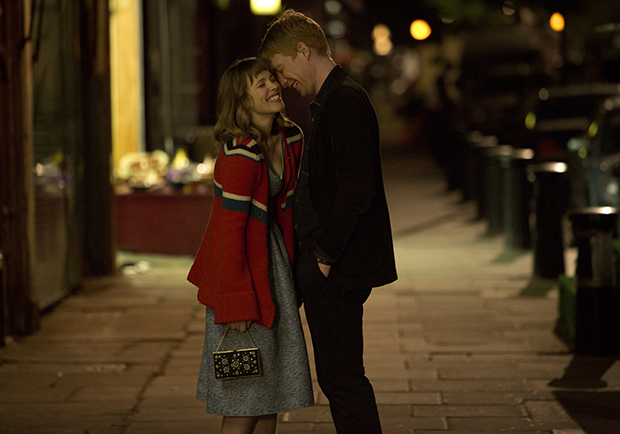Well, I enjoyed About Time—and when I said something to that effect on Twitter after the screening this week, a bunch of people responded in disbelief. "The trailer was so awful!" they said. (Tweeted.)
Having now watched the trailer, I agree: the film that trailer is advertising looks derivative and dull, a disappointment for writer/director Richard Curtis. This is the man who wrote Notting Hill, Bridget Jones's Diary, and Love Actually (which he directed, too), plus a bunch of episodes of Black Adder and Mr. Bean and even the screenplay for the much-celebrated War Horse. So why, you might be justified in asking, would he be making something that looks to be some kind of cross between The Notebook and a more maudlin About a Boy?
Thankfully, About Time is only loosely based on its trailer. In fact, it's not a romantic comedy at all. There is romance and comedy, to be sure, plenty of both. But it's got a bit more substance at its core, and is just good-hearted enough to sidestep tired rom-com (and time-travel) tropes.

We meet our hero, Tim Lake (Domnhall Gleeson, who played Bill Weasley in the final Harry Potter installments), not long after his twenty-first birthday. Tim leads a happy life. His father (the magnificent Bill Nighy) retired early from his teaching job to spend more time with Tim and his free-spirited little sister they call Kit Kat. Along with Tim's mother and uncle, the family takes tea on the beach every day, watches movies together on Friday nights in the garden, and seems to genuinely love being together.
Tim, like many a lanky 21-year-old, is still awkward around girls, and the morning after one particularly cringe-y New Year's Eve party (at which Tim chummily shook the hand of the girl next to him while everyone else kissed at the stroke of midnight), Tim's father calls him into his study and sits him down. He's got an announcement. "Ready for spooky time?" he asks.
Turns out that the men in the Lake family have always been able to travel back in time by climbing into closets, thinking back to a moment in their lives, and then clenching their fists. Instantly they're back. They can travel back as often as they want and then return to the present day (though, as Tim's father says, they can only travel back to points in their own lifetimes, which negates certain possibilities with, say, Hitler or Helen of Troy).
Tim's father's counsel, based on the mistakes of their male ancestors, is to take this seriously and think about what he really wants from life. Tim, being twenty-one, really just wants a girlfriend. But he's mature enough to know that for him, "it was always going to be about love."
Soon, after having his heart broken and discovering that all the traveling back in the world won't make someone love you, he moves to London to pursue a career in law. And then one night, he meets Mary (Rachel McAdams), a bookish, sweet, and witty American girl who, after a little time-related finagling, falls in love with Tim. And that's just the beginning.

There's at least fourteen holes in this time-travel premise for the cynical viewer to gaze through irritatedly. And yet, the film does something charming and gutsy: it just lets the holes exist and doesn't apologize. If that bothers you, then do not watch this film. If you're kind of okay with it, keep reading.
Most time travel films (I'd start naming them here, but you can think of them easily) are essentially about a single point. If you could go back in time and change something, then everything in your life would be worse in some way, as in that Avett Brothers song: "And I can't go back / and I don't want to / 'cause all my mistakes / they brought me to you."
It's a premise meant to charm or coax moviegoers into being a bit more content with their life choices, and there's no real harm there. But the thing is, even if you believe that everything happens for a reason, you might still wonder what might have been. Even those who are content with their lot still wish they might have said or done something different in the past. Parents often say as their children grow older that they wish they'd spent time cherishing them more; all of us have times in our lives we wish we'd properly appreciated.
That's what's fun about About Time. It's a fairy tale, of sorts, or maybe a fable, a story told to teach us a lesson. Tim can go back and properly appreciate things, but the lesson he learns from that is one that, while not groundbreaking in the least, is nice to be reminded of: the dailyness of life has a sort of sacredness about it that we too easily miss.
It helps that this is a great cast working with an often very funny and very sweet script; Gleeson and McAdams (who seems to be playing a less hipster Zooey Deschanel) are just plain fun to watch together, and Nighy is a joy. The characters they play have relatively easy lives, sure. But they still experience difficulty and death and setbacks, which is actually what most of us experience, too.
So I suppose what I'm saying is that there's plenty to pick apart in the film regarding time travel or sentimentality, but it might be better in this case to just put your feet up and enjoy it and let the film work on you a bit, even if it means you laugh or cry. It's not an ironic film, nor a snarky one, nor even a tongue-in-cheek one. It's just sincere and hopeful. And that's refreshing.
That's also why the marketing campaign ("the time travel rom-com") is so frustrating. It indicates something a bit troubling, and here's why: rom-coms are, by nature, films that end at the point where we know our hero and heroine are going to give it a go, long-term. They don't get too far past the wedding day, if they even get there.

The genre comes under fire from a lot of people because of this, sometimes rightly—Mindy Kaling's character on The Mindy Project is a great example of what happens when a steady diet of rom-coms goes awry—but humans have always known that there's something fun and relaxing about a good love story. That's what About Time's trailer seems to say it is.
Yet there's actually something a lot deeper here: there's romance, sure, but there's also deep love between siblings, and parents, and spouses, and friends. After the wedding comes a life. No man is a castle, and neither is any marriage; it needs to let others in, to be hospitable, to be truly healthy. Over time, our lives fill up with people who we met in odd circumstances, with our families and friends—and when we live a good life, our circle widens. (I'm thinking of Mike Leigh's marvelous Another Year here as one film that captures this well.)
The trouble with having to brand About Time as a romantic comedy is that it implies we audiences won't go see a movie that isn't just a romance—that plain ordinary love between parents and children, husbands and wives, and friends isn't enough to keep our interest, or worse, that it's too sentimental and maudlin to get us in the door.
It implies that we think butterflies-in-the-tummy is the highest form of love. And unfortunately, often we do. No wonder we chase it so strenuously. No wonder it is an idol for so many (those in long-term relationships as much as anyone else).
But what the actual film shows is a love of a kind worth chasing, love that actively cares about its object's well-being. Tim knows this implicitly—one of his early acts of time-travel is to help a friend. But the reason we know it, we come to understand, is that he has learned that kind of love from his father. Being loved that way lets him pass it on to others, whether it's his curmudgeonly landlord or his dweeby best friend or his wife or his children or his sister.
I don't know about you, but I would love to live in a world where we can advertise a film like About Time with the line "for me, it was always going to be about love" and all get that this means something bigger and richer than only romance. But in the meantime: feel free to ignore the plot holes and enjoy the ride.
Caveat Spectator About Time is rated R, but I suspect it barely made the cut out of typical PG-13 territory, and then probably only for language. A character gets in a car accident after drinking and is injured; it's strongly implied that her boyfriend has been abusing her. Another character battles a terminal illness. There is a sprinkling of cuss words, including a few f-bombs from a particularly foul-mouthed playwright, and at least one British euphemism for sex. Two unmarried characters definitely have sex on their first date, but we don't see anything (they are covered in sheets afterward); later they live together. There's a joke about oral sex. In one scene, a character removes her bra, but then covers her breasts (entirely) with her hands. In the background of one shot is a topless naked photo of Kate Moss; the scene passes rapidly. One minor character is referred to a few times, jokingly, as a prostitute.
Alissa Wilkinson is Christianity Today's chief film critic and an assistant professor of English and humanities at The King's College. She tweets at @alissamarie.









